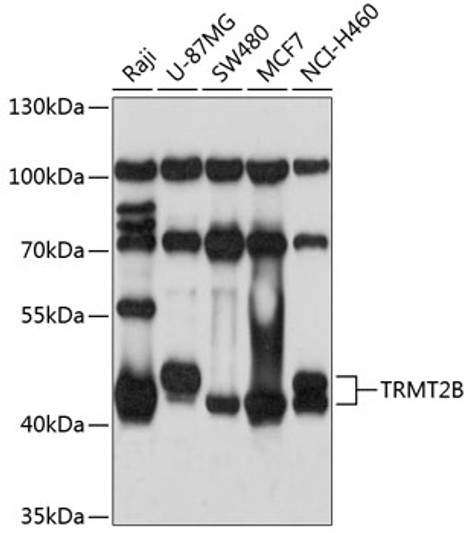| Host: | Rabbit |
| Applications: | WB/IHC-P/ELISA |
| Reactivity: | Human/Rat |
| Note: | STRICTLY FOR FURTHER SCIENTIFIC RESEARCH USE ONLY (RUO). MUST NOT TO BE USED IN DIAGNOSTIC OR THERAPEUTIC APPLICATIONS. |
| Clonality : | Polyclonal |
| Conjugation: | Unconjugated |
| Isotype: | IgG |
| Formulation: | PBS with 0.02% Sodium Azide, 50% Glycerol, pH 7.3. |
| Purification: | Affinity purification |
| Concentration: | Lot specific |
| Dilution Range: | WB:1:1000-1:2000IHC-P:1:50-1:200ELISA:Recommended starting concentration is 1 Mu g/mL. Please optimize the concentration based on your specific assay requirements. |
| Storage Instruction: | Store at-20°C for up to 1 year from the date of receipt, and avoid repeat freeze-thaw cycles. |
| Gene Symbol: | TRMT2B |
| Gene ID: | 79979 |
| Uniprot ID: | TRM2B_HUMAN |
| Immunogen Region: | 1-250 |
| Specificity: | Recombinant fusion protein containing a sequence corresponding to amino acids 1-250 of human TRMT2B (NP_079193.2). |
| Immunogen Sequence: | MAGLKRRVPLHSLRYFISMV GLFSKPGLLPWYARNPPGWS QLFLGTVCKGDFTRVIATKC QKGQKSQKKPSHLGPLDGSW QERLADVVTPLWRLSYEEQL KVKFAAQKKILQRLESYIQM LNGVSVTTAVPKSERLSCLL HPIIPSPVINGYRNKSTFSV NRGPDGNPKTVGFYLGTWRD GNVVCVQSNHLKNIPEKHSQ VAQYYEVFLRQSPLEPCLVF HEGGYWRELTVRTNSQGHT |
| Function | Mitochondrial S-adenosyl-L-methionine-dependent methyltransferase that catalyzes the formation of 5-methyl-uridine in tRNAs and 12S rRNA. Catalyzes the methylation of uridine at position 54 (m5U54) in all tRNAs. Specifically methylates the uridine in position 429 of 12S rRNA (m5U429). Does not affect RNA stability or mitochondrial translation. |
| Protein Name | TrnaUracil-5--Methyltransferase Homolog BTrm2 Homolog BRrnaUracil-5--Methyltransferase Trmt2b |
| Cellular Localisation | MitochondrionIsoform 1: Mitochondrion Matrix |
| Alternative Antibody Names | Anti-Trna antibodyAnti-Uracil-5--Methyltransferase Homolog B antibodyAnti-Trm2 Homolog B antibodyAnti-Rrna antibodyAnti-Uracil-5--Methyltransferase Trmt2b antibodyAnti-TRMT2B antibodyAnti-CXorf34 antibody |
Information sourced from Uniprot.org









